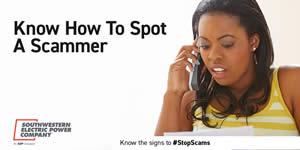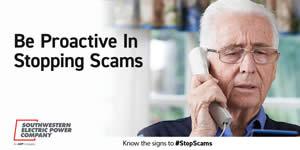November 13, 2017 – Southwestern Electric Power Company (SWEPCO) is proud to stand with its fellow electric, water, and natural gas utilities and trade associations in support of Utilities United Against Scams (UUAS). UUAS is a consortium of more than 100 U.S. and Canadian utilities and will observe the second annual Utility Scam Awareness Day, Wednesday, November 15, as part of a week-long advocacy and awareness campaign, November 13 – 17.

Many electric, water, and natural gas customers throughout the country are being targeted by impostor utility scams each day. Scammers typically use phone, in-person, and online tactics to target these customers. Scammers pose as electric, water, or natural gas company employees, and they threaten that customers’ services will be disconnected or shut off if they fail to make an immediate payment – typically using a prepaid card or other non-traceable form of payment.
Scammers can be convincing and often target those who are most vulnerable, including senior citizens and low-income communities. They also aim their scams at small business owners during busy customer service hours.
“Scammers are targeting local businesses, senior citizens and customers whose native language is not English,” said Brett Mattison, SWEPCO’s director of customer services and marketing. “We’re sharing this information so customers can protect themselves from this fraudulent activity.”
“SWEPCO employees will never demand immediate payment, insist a payment be made with a prepaid credit card or ask a customer to meet us in a parking lot to make a payment,” said Mattison.

Signs of Potential Scam Activity:
- Threat to disconnect: Scammers may aggressively tell the customer his or her utility bill is past due and service will be disconnected if a payment is not made – usually within less than an hour.
- Request for immediate payment: Scammers may instruct the customer to purchase a prepaid card – widely available at retail stores – then call them back supposedly to make a bill payment to his or her utility company.
- Request for prepaid card: When the customer calls back, the caller asks the customer for the prepaid card’s number, which grants the scammer instant access to the card’s funds, and the victim’s money is gone.
How Customers Can Protect Themselves:
- Customers should never purchase a prepaid card to avoid service disconnection or shutoff. Legitimate utility companies do not specify how customers should make a bill payment and always offer a variety of ways to pay a bill, including accepting payments online, by phone, automatic bank draft, mail, or in person.
- If someone threatens immediate disconnection or shutoff of service, customers should hang up the phone, delete the email, or shut the door. Customers with delinquent accounts receive an advance disconnection notification, typically by mail and included with their regular monthly bill. Companies never send a single notification one hour or less before disconnection.
- If customers suspect someone is trying to scam them, they should hang up, delete the email, or shut the door. They should then call their utility company at the number on their monthly bill or the company’s website, not the phone number the scammer provides. If customers ever feel that they are in physical danger, they should call 911.
Customers who suspect that they have been victims of fraud, or who feel threatened during contact with one of these scammers, should contact local law enforcement authorities. The Federal Trade Commission’s website is also a good source of information about how to protect personal information.
SWEPCO serves 532,000 customers in western Arkansas, northwest and central Louisiana, northeast Texas and the Texas Panhandle. SWEPCO’s headquarters are in Shreveport, La. News releases and other information about SWEPCO can be found at www.SWEPCO.com. SWEPCO is an American Electric Power (AEP) company. AEP is one of the largest electric utilities in the United States, delivering electricity to nearly 5.4 million customers in 11 states.









